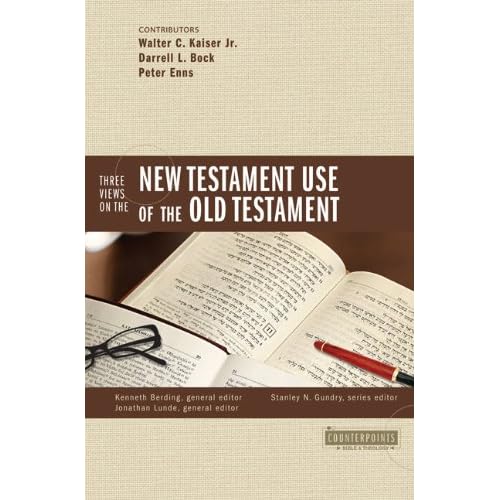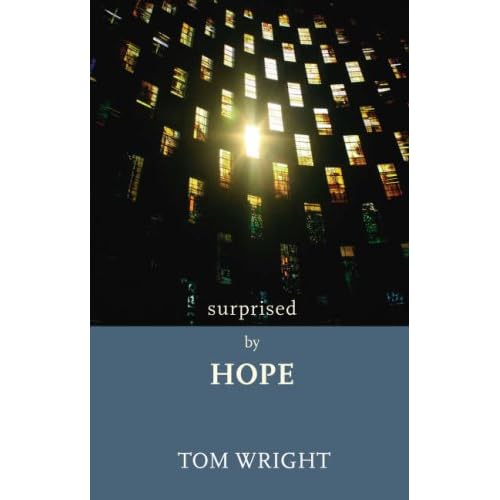Julie Peel – Unfold
A few days ago, I mentioned that I was reading a book entitled Three Views on the New Testament Use of the Old. I’m done now and wanted to make some reflections on the book and subject. So be forewarned… boring theology talk is about to commence. I use this blog for a variety of purposes, one of which is to think out loud. Therefore, you may want to simply click ‘play’ on the song above and enjoy a little background music while you go do something else on the internets.
 First, a few preliminary comments on the strategy of the book. It is a part of a series called Counterpoints which covers a wide variety of topics, including the Rapture, hell, women in ministry, baptism, and so on. The general layout of this series is that an editor will make some introductory comments, and then the various proponents of whatever view will sound off. After each view is presented, the other contributors have a few pages to respond to the main essay. The other day, I called it a theological cage match, but that wasn’t entirely fair. It really has the tone more of a cordial debate than a smack down.
First, a few preliminary comments on the strategy of the book. It is a part of a series called Counterpoints which covers a wide variety of topics, including the Rapture, hell, women in ministry, baptism, and so on. The general layout of this series is that an editor will make some introductory comments, and then the various proponents of whatever view will sound off. After each view is presented, the other contributors have a few pages to respond to the main essay. The other day, I called it a theological cage match, but that wasn’t entirely fair. It really has the tone more of a cordial debate than a smack down.
The contributors for this particular volume are well known biblical scholars in the evangelical academic community: Walter Kaiser, Darrell Bock, and Peter Enns. The volume editor, Johnathan Lunde, makes some very helpful introductory comments on the subject of NT/OT intertextuality which provide even the uninitiated with some handles to begin to grasp the major contours of the lay of the land.
And it is very unfamiliar territory indeed. Sometimes it is easy to forget that the New Testament is inextricably linked to the Old. For example, you can buy a New Testament that is unencumbered with all that lengthy prolegomena. A not so subtle suggestion that we don’t really need to know what is in the Old Testament, just the bits that involve Jesus and everything after that. Frankly, its a bit offensive. Can you imagine if they sold an Old Testament only version of the Bible? Funny to think that was all Jesus, Paul, and the gang had to work with. And yet, even a casual reading of the New Testament reveals its dependence on the Old Testament both for its major themes and frequently for exact wording. Ok, nothing really debate worthy there.
However, if one puts those references and quotations under greater scrutiny, a problem emerges. Sometimes, it looks as if the New Testament author hasn’t really understood the Old Testament passage correctly or has taken something out of context, and in doing so has imported a meaning onto the text that wasn’t there in the original Old Testament author’s mind.
The classic example is in Matthew 2:15, where he quotes Hosea 11:1 – “Out of Egypt, I have called my son.” In Matthew, the verse is cited as being somehow prophetic with respect to the journey that Jesus’ family makes to and from Egypt early in his childhood. Now, if one just sort of blows through Matthew without pausing for much reflection, the reader is unaware of any “foul play.” However, when one goes back to Hosea, it seems (to some) that the text doesn’t seem prophetic at all, but is instead a look back at God’s saving act in history – specifically the deliverance of Israel from Egypt under Moses’ leadership. In this context, it is relatively clear that Israel is the “son.”
So there is a tension there… Is Matthew playing fast and loose with the text? Is he a poor exegete and misunderstood what Hosea has said? How one resolves this “tension” is largely shaped by certain understandings of how the New Testament authors approach the Old. Kaiser (and those sympathetic with his view) doesn’t see the possibility of two different meanings for a single text. Rather, the Old Testament author had an intended meaning and whatever the New Testament author is doing must agree. So for example, Kaiser would likely argue that the Hosea text was in fact predictive and that the “son” there looked forward to Jesus in some way and that Hosea would have been conscious of the predictive element in his writing.
Bock represents a fairly nuanced view that sees patterns in biblical history. So, he wouldn’t necessarily need to argue that Hosea was predictive in a strict sense. However, due to God’s consistent patterns of deliverance throughout history, Matthew is capitalizing on or evoking a theme of deliverance that up until Jesus was most clearly expressed in the exodus tradition. It is more complex than that, but this sort of approach both recognizes the tension and assumes the best about Matthew in his use of the Old Testament.
The final view that is articulated by Enns is that Matthew is simply employing exegetical practices common to that time that paid more attention to specific words and how they could be mined for meaning apart from the actual original context. While this lack of regard for original context might cause concern to the modern reader, Enns would argue that we shouldn’t expect ancient interpreters to conform to modern hermeneutical practices. God’s Word was spoken into a certain places and times and bears all the marks (including the “faulty” interpretive traditions) of that culture.
Ok, as you might guess, it is far more complicated than that, but that’s why these guys wrote a book, not a blog post. If you are still reading (and that’s a big ‘IF’), rest assured that all of the positions have merit and can be held by intelligent faithful readers of the Bible. However, my own view is something of a combination of Bock and Enns. I appreciate Enns’ observation that the Bible will inevitably reflect the culture in which it was forged. And yet, I also would affirm that due to its dual authorship (man AND God), that it can transcend culture and take in the grand sweep of redemptive history.
Despite the differences of opinion, one thing that everyone agrees on is that the New Testament’s interpretation of the Old Testament has been indelibly marked by the one we know as Jesus of Nazareth. After Christ, everything written in the Old Testament had to be re-looked in the light of Christ’s coming, living, dying, and rising. May our own interpretation of Scripture – both “Old” and “New” – reflect the same.
 I like the front cover. I read the back cover. It is endorsed by people who I am drawn to… and some that I’m not. But I know that the author (or publisher) is speaking my language when he says,
I like the front cover. I read the back cover. It is endorsed by people who I am drawn to… and some that I’m not. But I know that the author (or publisher) is speaking my language when he says,




